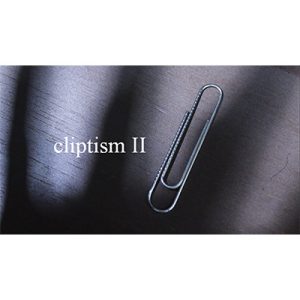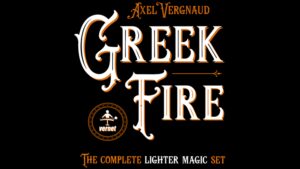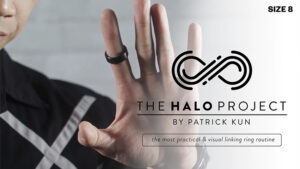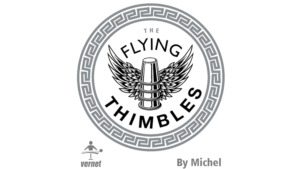Volume 1 Contains :
The Invisible Deck – You know the effect of this classic trick: A freely named card is the only face-down card in a face-up deck. But when you watch the performance, you’re going to get fooled. Using routines by Bruce Cervon, Allan Ackerman, and Steve Beam as a starting point, Michael has produced a streamlined handling which uses an ordinary deck of cards. Magicians around the world have speculated about this trick. Now you’ll learn all the work.
The Smiling Mule – A classic by Roy Walton. Michael has eliminated the one bad “moment” in the trick, and the results are staggering. Suitable for close-up or stand-up, this routine has been a mainstay in the repertoires of many top card men.
The Ooh-Ah Bird – Give your fingers a rest. Here’s the perfect trick if you have to perform for children in a restaurant. The routine is simple, colorful, funny, mysterious, and the child takes an origami figure home as a souvenir. Plus, you’ll learn some new work on the venerable Cross-the-Cut Force. If you’re new to card magic, this is the perfect trick for you.
The Pothole Trick – This is the big one! One of the most talked about tricks in magic, and one of the most baffling. There are lots of “moving hole” tricks out there, but none have the impact and the memorability of The Pothole Trick. If you could really move holes, this is how it would look. Plus, the spectators take home your business card in an impossible condition. Even if magic isn’t your profession, if you hand out business cards, The Pothole Trick will make you money. This is one of Michael’s most prized routines, and this is the first time the method has been explained on video. In addition, Michael reveals some secrets which have never been released before. This trick is worth the price of the video.
Dr. Strangetrick – This handling for Card Warp may well be the most amazing and convincing yet created. Designed to fool the most astute spectator, this is Michael’s favorite opening routine. For the first time, all the work is revealed; nothing has been held back.
The Judah Shoelace Routine – A great penetration effect resurrected. Stewart Judah’s wonderful trick fell out of favor because it required a paper straw. Michael’s solution is simple, and makes it easy to carry the props in your pockets.
A Trick for O’Brien – George Orwell would have loved this. Utilizing the concept of “who controls the present controls the past; who controls the past controls the future,” a prediction effect is raised to miracle status. The principle involved can be applied to many other effects.
The Imagination Tester – A weird origami effect in which a paperfold of a belt buckle becomes real.
Tut Tut – Four widely-spaced Aces come together and trap a selected card. This sneaky effect allows you to shuffle a deck many times and still be ready for memorized deck mysteries.
Myopia – This is very close to real mindreading. Two spectators think of cards. The magician asks one question and can immediately name the cards.
The Birthday Book – A spectator selects a playing card. A date book is shown; next to each date is a playing card. The card written next to the spectator’s birthday is shown. He has selected the exact same card. Michael Close has used this method to fry magicians and laymen around the world.
Volume 2 Contains:
Pink Floyd – The backs of four jokers change from blue to red to blue again. The perfect opening routine, and it resets immediately! Pink Floyd is an object lesson in logical and efficient card handling.
Renaldo the Great – A routine for the venerable Chinese Prayer Vase that will fool your magic buddies and the smart-aleck kid at the restaurant. This funny routine is perfect for table hopping.
The El Cheepo Magic Club – Based on Paul Harris’ Flash Fold, this is a great routine for kids, and it leaves your business card with the parents. The El Cheepo Magic Club also provides a lesson in using presentation to cover methodological restrictions.
Coda Chrome – An unbelievable three way coincidence that will completely baffle magicians and laymen. Based on a trick by Stewart James, Coda Chrome brings the use of “outs” to a new level.
Chicken Teriyaki – A beautifully routined Copper- Silver transposition which rings in the gaff in a way that will fly by anybody. Perfect for walk-around conditions, and the magic happens in the spectator’s hands.
You Hue – A Wild Card routine using the spectator’s name and a freely selected color marker. You Hue demonstrates another diabolical use of outs, and the gaff can be used in many other effects. A stunner!
Red Blue Mama Fooler – This trick has a strange name, but the effect is killer. The audience decides on the name of any card. A red-backed deck is spread; there is one blue-backed card in the deck. It is the named card. For a kicker, a blue-backed deck is spread. There is only one red-backed card in it. It is also the named card.
The Wishing Trick – This is the trick Michael Close developed to help him become comfortable using a memorized deck. The routine is charming, and you will learn important techniques for the memorized deck.
The Haunted Deck – Anyone names any card. Without any overt manipulation, the deck cuts itself at the named card. This is another memorized deck trick, but it can also be done without the memorized deck. In addition, Michael has added a visual touch that makes it look as if the deck is alive.
Reverse Logic – Here’s the perfect card routine for the strolling performer: a series of baffling card reversals. Because the routine is modular, you can stop at any point and still have a strong ending.
26 Cents Worth of Change – This routine is a rarity in magic: a truly impromptu coin trick. Two dimes go through a series of logical changes, ending up with the magician holding only a penny. This is another excellent strolling routine.
Flying Home – This is Michael Close’s routine for the classic “Homing Card” effect. A signed card flies to the pocket two times. As a kicker, the entire deck flies to the pocket, except for the signed card.
Volume 3 Contains:
Erma la Fource – This method for the classic “Oscar” trick fools magicians and laymen alike. The magician makes a prediction: The Name of Your Card is Erma! The spectator names any card. He deals through the deck himself. Each card bears a different name on the back. There is only one “Erma” card. It is the card he named.
Tamariz Rabbits – Michael Close’s routine for Juan Tamariz’ very commercial packet trick. Michael has eliminated the need to switch cards in your pocket, and has still retained the maximum number of changes. This is a wonderful trick for children. The Unreality Machine – Here is another strange Origami effect, involving an offbeat transposition between an origami snowball and a pack of matches. The climax looks like “morphing.”
Close’s Clones – A restaurant routine that provides enormous laughs with minimum work. This is a topical, funny, and very commercial routine.
Down for the Count – Here’s another funny routine that is simple to do. The magician proves beyond a shadow of a doubt that someone at the table is a vampire.
The Card, the Forehead, and the Saltshaker – One of Michael Close’s favorite routines, and a masterpiece of audience management, this is the first time that all the work has been explained on video. Audiences around the world have raved over this routine; now is your chance to learn all the details from Michael Close.
Too Ahead – This three-phase coin routine is a fine example of diabolical routining. Done standing, it is perfect for table hopping. The subtle handling involved has fooled some of the best magicians in the world, and can be applied to other effects.
Four-Card Reiteration – Dan Garrett’s marvelous routine provides a lesson in expert card handling. Included is a discussion on palming, and Michael’s utility move, The Last Card Push.
The Lie Detector – The most commercial version
Volume 4 Contains:
The Big Surprise – The perfect way to open and close your show. A funny and seamless handling of the classic Card in Box effect. The assisting spectator discovers that the Big Surprise Canister really does contain a big surprise.
A Visit from Rocco – A charming presentation for a great Larry West trick. Using giant bills, the magician gives Rocco and the audience a lesson in arithmetic.
Rocco Returns – Rocco’s back, with a lesson in Find the Lady. This routine for Ton Onosaka’s Lucky Lady provides valuable information concerning the motivated handling of props.
Ring Fright – Michael synthesizes ideas from Gaetan Bloom and Terri Rogers to produce a remarkable two object transposition. And because no pulls are used, no harm can come to the spectator’s finger ring.
Take a Letter – A weird effect using common stationery items. Never have so many magical principles been used in the cause of such a strange routine.
Butte Ox? Two Butte Ox! – Michael’s handling for the classic Johnny Paul Cheek to Cheek effect. Hilarious and a lesson in intelligent, motivated card handling. And the Unbelievably Useful Comedy Prop comes into its own. This routine is a mainstay of Michael’s stand-up act.
Bonus routine! – Michael performs (but does not explain) Stupid Travelers. Never has masterful card technique and maniacal behavior been combined in such a silly way. You’ll laugh, you’ll cry, you’ll phone the authorities.
Rubik’s Dollar Bill – A penetration effect using a dollar bill, a playing card, and a toothpick. This is the first time all the work has been explained on video!
The Growing Toothpick – Thirty seconds of eye-candy, as a toothpick triples in length.
Origami Bill Production – A simple and flashy way to give the spectators an origami souvenir. A borrowed bill instantly folds itself into an origami figure. Attach the bill to your business card and you’ve got the perfect give-away.
The Frog Prince – Hailed by the cognoscenti as one of the new “classics” of close-up magic, and one of the most astounding and memorable card routines ever created. A freely selected card transposes with a card which has been folded into an origami frog. An absolute reputation maker.







Reviews
There are no reviews yet.